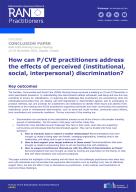Details
- Publication date
- 7 February 2023
- Author
- Directorate-General for Migration and Home Affairs
- Country
- Croatia
- RAN Publications Topic
- Vulnerable youth and youth engagement in P/CVE
Description
The Families, Communities and Social Care (FC&S) Working Group convened a meeting on 22 and 23 November in which participants focused on 1) understanding how discrimination affects individuals’ well-being and how this may contribute to drivers for radicalisation, 2) exploring the challenges that practitioners are encountering when the individuals/communities they are dealing with feel stigmatised or discriminated against, and 3) exchanging on practical methods, tips and practices for practitioners and institutions to identify these issues and address them.
Participants at this meeting were P/CVE practitioners supporting individuals and wider communities who experience institutional, social or interpersonal discrimination, such as social and youth workers, community police officers, local coordinators and community mediators.
The key outcomes of this meeting are:
- Discrimination can contribute to the radicalisation process as one of the drivers in the broader breeding ground of radicalisation. The 3N model in this paper will further clarify this.
- Practitioners have identified several challenges they face in their work, when they are supporting communities and individuals that feel discriminated against. They can be divided into three main questions:
- How to maintain and/or restore a trustful relationship? Recommendations that were brought up relate to being open and honest, managing expectations, investing time in the relationship, and taking time to get to know each other.
- How to best support your target audience in these cases? Recommendations that were brought up relate to empowering them to act and boosting their self-confidence.
- How to support practitioners themselves with the effects of discrimination on them? Recommendations that were brought up relate to training and supervision on this theme, to help deal with these situations and overcome prejudices.
This paper outlines the highlights of this meeting and will delve into the challenges practitioners face when they work with individuals and communities that experience discrimination such as building trust, how to effectively support them, but also the effect it has on themselves as practitioners. It also outlines recommendations to overcome these challenges.

